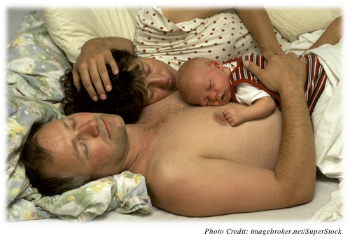

Chapter 1. Happiness, Marriage, and Babies: Is There a Secret?
Synopsis

Happiness, Marriage, and Babies: Is There a Secret?
Author
Pauline Davey Zeece, University of Nebraska – Lincoln

Synopsis
This activity focuses on the relationship between marriage, happiness, and the arrival of a new baby. Internationally recognized marriage researchers, John and Julie Schwartz Gottman, present strategies for surviving marriage when baby makes three.
REFERENCES
Argyle, M. (2001). The psychology of happiness. New York: Routledge.
Diener, E., Gohm, C. L., Suh, M., & Cishi, S. (2000). Similarity of the relation between marital status and subjective well-being across cultures. Journal of Cross-Cultural Psychology, 31, 419–436.
Diener, E., Suh, M., Lucas, R. E., & Smith, H. E. (1999). Subjective well-being: Three decades of progress. Psychological Bulletin, 125, 276–302.
Glick, J., Ruf, S., White, M., & Goldscheider, F. (2006). Educational engagement and early family formation: Differences by ethnicity and generation. Social Forces, 84, 1391–1415.
Inglehart, R. (1999). Culture shift in advanced industrial society. Princeton, NJ: Princeton University Press.
Johnston, D. R., & Wu, J. (2002). An empirical test of crisis, social selection, and role explanations of the relationship between marital disruption and psychological distress: A pooled time-series analysis of four-wave panel data. Journal of Marriage and the Family, 64, 211–224.
Pew Research Center. (2007). As Marriage and Parenthood Drift Apart, Public is Concerned about Social Impact. Retrieved on December 19, 2007 at http://pewresearch.org/pubs/526/marriage-parenthood
Shapiro, A. F., Gottman, J. M., & Carrere, S. (2000). The baby and the marriage: Identifying factors that buffer against decline in marital satisfaction after the first baby arrives. Journal of Family Psychology, 14(1), 59–70
Marriage and Happiness

Does marriage make people happy or do happy people get married? This and similar questions have been raised in developmental literature. What do you think?
Studies on the effect of marriage on people’s happiness suggest that generally, married people are a little happier, healthier, and richer than unmarried people of the same age and background. Even though married people in the United States reported being “very happy” more often than did single people (Ingelhart, 1990), do not go running to the altar without some additional consideration! For instance, in Portugal, single people reported being happier. In France, single people reported the same level of happiness as those who were married (Diener et al., 2000). These differences in attitudes about happiness held by either single or married people in a variety of countries are generally slight.
Why Do Married People Report Being Happier?

One suggestion is that marriage provides additional sources of self-esteem and a refuge from loneliness (Argyle, 1999). When an individual has a loving spouse, it is easier for that person to accept difficulties in other parts of life, such as trouble at work, financial strain, or social challenges. Married people are more likely to experience a lasting and supportive intimate relationship, and they suffer less from loneliness.
Among the non-married, those who cohabit with a partner are significantly happier than those who live alone, but this effect is dependent on the culture in which one lives. It turns out that non-married people living together with partners in individualistic societies that foster independence and individual achievement tend to experience egalitarian relationships and flexibility in roles. Therefore, they report higher life satisfaction than single and sometimes, even married people in those same societies. The opposite trend appears in collectivist societies that prioritize adherence to social norms over individual interests and personal goals.
Factors Affecting Marital Happiness

One major factor affecting marital happiness is age at the time of marriage. Couples who marry as teenagers are more likely to be depressed, violent, and less educated than those who marry later in life (Glick et al., 2006). Another determinant of marital happiness is the quality of the relationship between partners. Relationship quality is affected by such things as childhood family relationships, homogamy, cohabitation before marriage, and some of the Big Five personality traits.
The Big Five are those personality traits that remain relatively stable throughout adulthood. They include the following dimensions:
- openness – being imaginative, curious, artistic, creative, open to new experience;
- conscientiousness – being organized, deliberate, conforming, self-disciplined;
- extroversion – being outgoing, assertive, active;
- agreeableness – being kind, helpful, easygoing, generous;
- neuroticism – being anxious, moody, self-punishing, critical.
1.
Which of the following is a more realistic example of how the Big Five Traits might contribute to a happy marriage?
When Baby Arrives

Some psychologists suggest that transitions or changes in a marriage can affect happiness or subjective well-being (Diener et al., 1999; Johnson and Wu, 2002). One such change is the addition of a baby to a family. By a ratio of nearly three to one, more Americans than ever before say that the main purpose of marriage is “forming a lifetime union between two adults for their mutual happiness and fulfillment” than say its main purpose is “forming a lifetime union between two adults for the purpose of bearing and raising children.” The majority of respondents to a Pew Research Center study indicated that people should be married before having a child (Pew Research Center, 2007). The connections between marriage, happiness, and having a child seem to be very complex.
Nevertheless, children are still vital to adult happiness. Although they may be perceived as less central to marriage than in previous decades, they remain important to most parents. Yet, the arrival of a new baby can cause stress on a marriage.
Surviving Marriage After Baby: Identifying the Problems

Research has found that two-thirds of couples experience a significant decline in marriage satisfaction after the first baby arrives (Gottman, 2000). At the Relationship Research Institute, psychologist John Gottman directs an ongoing study called the “Bringing Baby Home Project” in which he examines the toll that babies can take on a marriage.
Play the video to hear what Dr. John Gottman and his wife, Dr. Julie Schwartz Gottman, share about surviving marriage after a baby.
2.
The Gottmans explain that about two-thirds of parents say that they are not content with their marriage three years after the birth of their baby. According to the Gottmans, what factors contribute to this discontent?
Surviving Marriage After Baby: Addressing the Problems

Play the video to hear Dr. John Gottman and his wife, Dr. Julie Schwartz Gottman, discuss strategies that might help save a marriage after the arrival of children.
3.
According to the Gottmans, what can couples do to help their marriages survive after the arrival of children?
Assessment: Check Your Understanding

4.
1. Which of the following is NOT one of the Big Five Traits?
Assessment: Check Your Understanding

5.
2. One of the ways to cope with a new baby while supporting a marriage is to remember that everybody goes through the same thing.
Assessment: Check Your Understanding

6.
3. Savoring the friendship means that a married couple with a new baby should understand why there is not time for doing for one another all the special little things that they did before the baby was born.
Congratulations! You have completed this activity.Total Score: x out of x points (x%) You have received a provisional score for your essay answers, which have been submitted to your instructor.